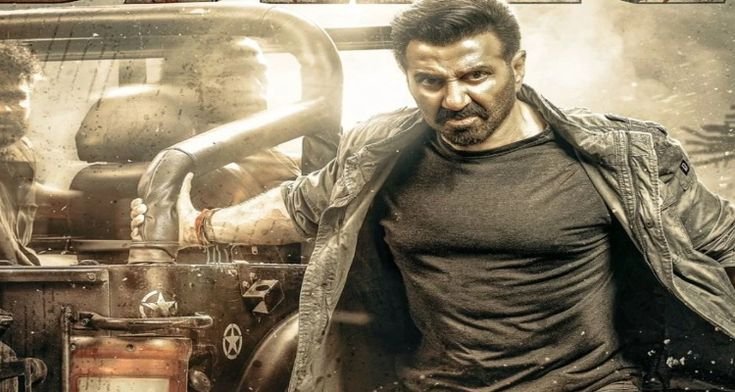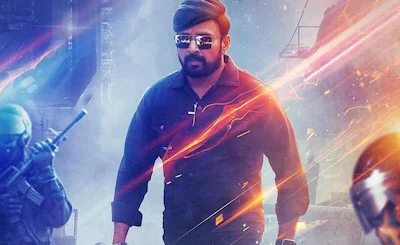Jaat (2025) – Movie Review: A Roaring Comeback for Sunny Deol

The action-packed drama Jaat, released on April 10, 2025, brings Sunny Deol back to the big screen with thunderous impact. Directed by Gopichand Malineni, the film mixes gritty action, rooted emotions, and a story steeped in rural realism. Jaat features a star-studded cast including Randeep Hooda, Vineet Kumar Singh, Regina Cassandra, and Saiyami Kher. It explores the clash between justice and corruption in a lawless region, anchored by a towering performance from Deol himself.
Let’s dive deep into what makes Jaat a fiery, if not flawless, cinematic ride.
Plot Overview
The story unfolds in the coastal village of Ramayapatnam, Andhra Pradesh. Varadaraja Ranatunga, a feared land baron portrayed by Randeep Hooda, rules the village with terror. He manipulates the system, exploits the poor, and suppresses any form of dissent. No one dares to challenge him—until a stranger arrives.
Sunny Deol plays this mysterious outsider. He doesn’t come with fanfare, but he carries history, pain, and unshakable resolve. When he witnesses the brutality inflicted on the innocent, he doesn’t stand by. He fights back—first in subtle ways, then with unrelenting force.
As the conflict escalates, the stranger rallies the villagers, confronts Ranatunga’s syndicate, and reveals his own hidden past. What starts as a fight for justice turns personal, unleashing Deol’s rage in vintage style.
Performances
Sunny Deol dominates every frame with raw power and presence. Even at 67, he punches through the screen with his energy. He roars, growls, and hurls villains across courtyards like he never left the action genre. His dialogue delivery feels grounded and authoritative. He doesn’t just act; he commands attention.
Randeep Hooda matches Deol with a chilling performance. He doesn’t play a cardboard villain. He creates a layered antagonist—smart, ruthless, and unpredictable. His eyes burn with cruelty, and his voice carries quiet menace.
Vineet Kumar Singh adds weight in his supporting role as a local school teacher who assists Deol’s character. His sincerity brings emotional depth. Regina Cassandra and Saiyami Kher handle their roles with dignity, though the script limits their arcs. They provide emotional counterpoints but don’t get major moments to shine.
Direction and Execution
Director Gopichand Malineni knows his audience. He doesn’t waste time with complicated plot twists. He delivers a straightforward, high-voltage revenge saga wrapped in rural drama. He stages fights with raw brutality, shoots slow-motion entries with style, and crafts old-school heroism with reverence.
The film opens with a tight first act. It sets the stakes early. The second act builds tension, and the third explodes with action. The narrative sticks to familiar formulas, but Malineni keeps the momentum high.
He doesn’t overindulge in side plots. He keeps the focus locked on the hero versus villain conflict. Every emotional beat leads to a punch or a showdown. The simplicity works because the execution feels sincere and intense.
Cinematography and Visuals
Cinematographer Rishi Punjabi brings visual richness to the story. He captures the dry heat and harsh beauty of Andhra’s landscape with wide-angle shots and warm color tones. His camera lingers on intense stares, sweat-soaked faces, and slow-building tension.
The action scenes benefit from sharp framing. Whether Deol swings a lathi or launches himself into a wall of goons, the camera never misses the force of impact. The lens never shies away from blood, dirt, or bruises.
Even quieter moments—such as a sunset scene where Deol sits by a river—carry visual weight. The cinematography enhances the story without becoming flashy.
Sound and Music
Thaman S composes a powerful background score. He doesn’t hold back on drums, strings, or chants. His music amplifies emotions and ignites action. Tracks like “Touch Kiya” and “Oh Rama Shri Rama” inject rhythm into the film’s high-octane beats.
The songs fit within the narrative and don’t slow the pacing. Thaman uses music as a tool to elevate intensity, not as a distraction. Each fight scene hits harder because of his work.
Sound design plays an equally important role. Every punch lands with impact. Every bullet echoes. The mix between dialogue, ambient noise, and music creates an immersive experience.
Writing and Dialogues
The dialogues hit hard, especially when Deol speaks. He delivers punchlines that feel old-school yet timeless. “Insaaf ki ladaai mein, main sirf haath nahi uthata… tohfa bhi deta hoon,” he says before launching into a brawl.
Writers avoid unnecessary complexity. They focus on punchy lines, clear motivations, and sharp confrontations. The script doesn’t reinvent the genre, but it respects its legacy.
Some emotional scenes feel slightly rushed, especially those involving family flashbacks. The female leads deserved more narrative space. Still, the writing ensures every major character leaves a mark.
Critical Response
Critics responded with a mix of nostalgia and excitement. Many praised Sunny Deol’s commanding return. Others appreciated the no-nonsense storytelling and intense face-offs. Several noted the film’s reliance on familiar tropes but acknowledged the strength of execution.
Audiences responded more enthusiastically. Theatres in Delhi, Punjab, and parts of Maharashtra reported near-full occupancy during the evening shows. Fans cheered Deol’s re-entry scenes and whistled during action sequences. For many, the film reminded them of the golden era of action cinema.
Box Office Performance
Jaat opened strong on April 10, boosted by the Mahavir Jayanti holiday. It earned ₹4.35 crore by afternoon on day one, with projections estimating over ₹7 crore by the end of the day. Advance bookings crossed ₹2.37 crore, with over 113,000 tickets sold before release.
The film performed best in North India, particularly in Punjab, Chandigarh, and Delhi NCR. Single-screen theatres recorded higher turnout than expected. With the weekend ahead and word-of-mouth turning positive, the film looks set for a successful first week.
Conclusion
Jaat doesn’t aim to surprise. It aims to satisfy. It brings back Sunny Deol in full form—angry, intense, and unapologetically loud. It delivers on action, emotion, and mass-appeal moments. Yes, the film treads familiar ground, and yes, some characters deserve better arcs. But the overall execution works.
For fans of vintage Bollywood action, Jaat feels like a celebration. It pays tribute to old-school heroism while delivering the thrills of a modern masala entertainer.













